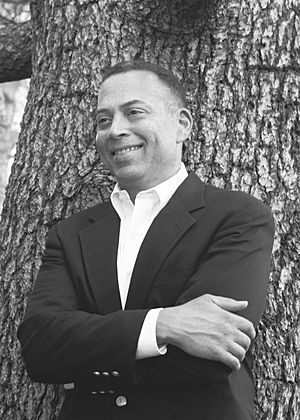W. Ralph Eubanks facts for kids
Quick facts for kids
W. Ralph Eubanks
|
|
|---|---|
 |
|
| Born | Warren Ralph Eubanks Jr. June 25, 1957 Mount Olive, Mississippi, U.S. |
| Occupation | Author; Journalist; Professor; Public speaker; Director of Publishing, Library of Congress |
| Language | English |
| Education | University of Mississippi University of Michigan |
| Genre | History; Memoir |
| Spouse | Colleen Eubanks |
| Children | 3 |
|
|
|
Warren Ralph Eubanks Jr. (born June 25, 1957) is an American author, journalist, and professor. He writes about important topics like race, identity, and the culture of the American South. From 1995 to 2013, he was the Director of Publishing at the Library of Congress in Washington, D.C.. He also worked as an editor for the Virginia Quarterly Review and taught at several universities.
Contents
Early Life and Education
Warren Ralph Eubanks Jr. was born on June 25, 1957, in Mount Olive, Mississippi. His parents were Warren Ralph Eubanks Sr. and Lucille Eubanks. He finished Mount Olive High School in 1974.
After high school, he went to the University of Mississippi. There, he earned a bachelor's degree in English and Psychology. He was also the president of the Sigma Tau Delta honor society, which is for students who excel in English and Literature. In 1978, he moved to Ann Arbor, Michigan. He studied at the University of Michigan and received a master's degree in English Language and Literature in 1979.
Career Highlights
Working in Publishing
After getting his master's degree in 1980, Eubanks started his career in publishing. He worked as a copy editor for the American Geophysical Union until 1984. Later, he joined Hemisphere Publishing in 1989. As a Managing Editor, he helped produce over 75 books and academic journals.
In 1990, he became the Director of Book Publishing for the American Psychological Association. He held this role for five years. In 1995, he began working at the Library of Congress as the Director of Publishing. He stayed there until May 2013.
In June 2013, he became the editor of the Virginia Quarterly Review at the University of Virginia. He left this position in February 2015.
Teaching at Universities
While working in publishing, Eubanks also taught. From 1992 to 1994, he was a faculty advisor for Howard University's summer book publishing program. He also taught at the University of Virginia from 1994 to 2002. There, he taught classes like "The World of Publishing" and "The Business of Publishing."
In 2009, he taught a class on writing memoirs at George Mason University. From 2016, he was a visiting professor at Millsaps College in Jackson, Mississippi. He taught creative writing and literature classes there, including "Crafting the Personal Essay" and "Civil Rights and Literature." Since 2017, Eubanks has been a Visiting Professor of Southern Studies and English at the University of Mississippi.
Writing Books and Articles
Eubanks has written several books, mostly memoirs about his life and family. His 2003 book, Ever Is a Long Time: A Journey into Mississippi's Dark Past, was named one of the best nonfiction books of the year by The Washington Post.
In 2009, his memoir The House at the End of the Road: The Story of Three Generations of an Interracial Family in the American South was published. This book explores American identity and race relations through the story of his family. In March 2021, he published A Place Like Mississippi: A Journey Through A Real and Imagined Literary Landscape.
Eubanks has also written many articles for newspapers and magazines. These articles often focus on education and race relations. He has written for The Washington Post, Preservation Magazine, The American Scholar, Chicago Tribune, WIRED, TIME, and The New Yorker.
He also reviews books for The Washington Post and The Wall Street Journal. He reviewed books by authors like William Styron, Abraham Verghese, and Nathan McCall. He also reviewed A Father's Law, a book by Richard Wright that was finished and published after Wright's death.
Radio Appearances
Eubanks has been a guest on National Public Radio to talk about race relations. In 2004, he appeared on All Things Considered. He discussed the 1964 murders of three civil rights workers: James Chaney, Andrew Goodman, and Michael Schwerner. Their deaths were linked to members of the Ku Klux Klan.
In 2009, he was a guest on Talk of the Nation. He spoke about race relations and police actions after the arrest of Henry Louis Gates Jr.
Personal Life
As of 2013, W. Ralph Eubanks lived in Washington, D.C. with his wife, Colleen Eubanks, and their three children. He is Catholic.
Awards and Recognition
- 2007 Guggenheim Fellowship from the John Simon Guggenheim Foundation
- The Bernard L. Schwartz Fellowship with the New America Foundation
- 2021-2022 Carl and Lily Pforzheimer Foundation Fellow, Radcliffe Institute for Advanced Study, Harvard University
- 2023 Mississippi Governor's Arts Award, Excellence in Literature and Cultural Ambassador
- 2023-2024 Society of American Travel Writers Foundation, Lowell Thomas Award, First Place for Coverage of Diverse Communities
Published Works
- Books
- Eubanks, W. Ralph (2003). Ever Is a Long Time: A Journey Into Mississippi's Dark Past, Basic Books. ISBN: 978-0738205700
- Eubanks, W. Ralph (2009). The House at the End of the Road: The Story of Three Generations of an Interracial Family in the American South, HarperCollins/Smithsonian. ISBN: 978-0061375736
- Eubanks, W. Ralph (2021). "A Place Like Mississippi: A Journey Through a Real and Imagined Literary Landscape", Timber Press. ISBN: 978-1604699586
- Articles
- "DNA Is Only One Way to Spell Identity", The Washington Post, January 1, 2006.
- "Still Learning From Dad", The Washington Post, June 13, 2006.
- "At Ole Miss, a Valedictory to the Old South", The Washington Post, September 21, 2008.
- "Retranslating the Blues", The Hedgehog Review, Summer 2025.
 | Delilah Pierce |
 | Gordon Parks |
 | Augusta Savage |
 | Charles Ethan Porter |

